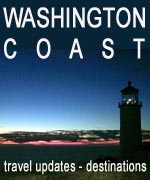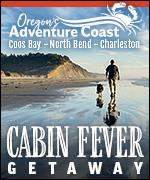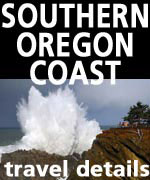Retro Music Review: Yes' Relayer a Surreal Masterpiece
Published 7/17/24 at 6:45 a.m.
By Andre' GW Hagestedt, Oregon Coast Beach Connection
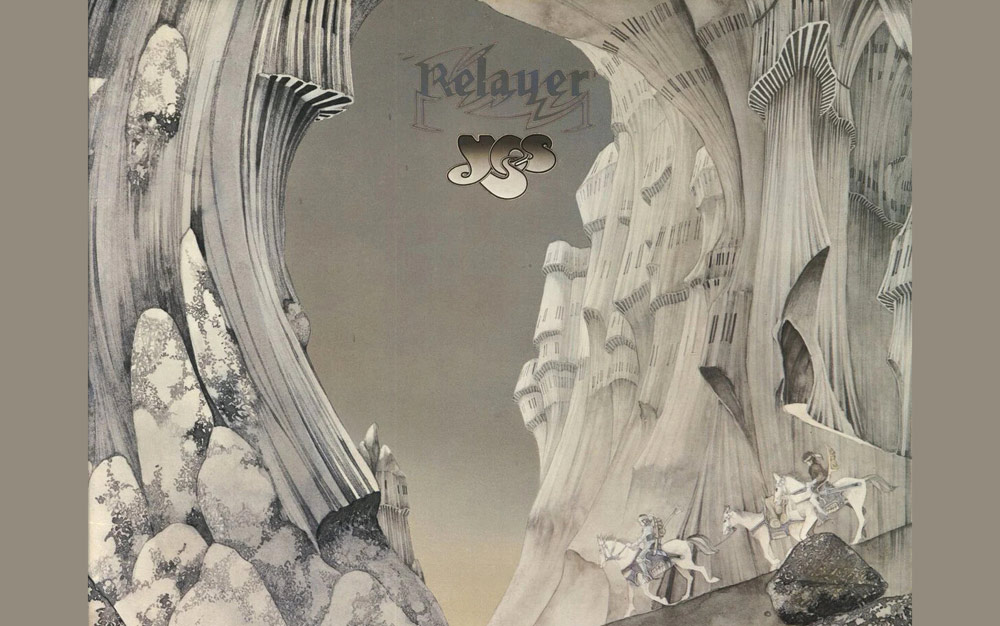
In 1973, Yes released its mega epic Tales from Topographic Oceans, and then in '74 their other most complex work, Relayer. Both went absolutely into the stratosphere with their esoteric approaches, going bizarre new places no other band at their level of popularity ever dared go. This was a time they were still selling out massive arenas, yet somehow they thought it would be a good idea to not just push, but shove, the boundaries outward. Topographic was a double album that had only four songs: each side of the LP was one, often seemingly-endless song, each clocking in around 22 minutes long.
Includes exclusive listings; some specials in winter
In Cannon Beach:
Includes rentals not listed anywhere else
In Manzanita, Wheeler, Rockaway Beach:
Some specials for winter
In Pacific City, Oceanside:
Some specials for winter
In Lincoln City:
Some specials for winter
In Depoe Bay, Gleneden Beach:
Some specials for winter
In Newport:
Look for some specials
In Waldport
Some specials for winter
In Yachats, Florence
Some specials for winter
Southern Oregon Coast Hotels / Lodgings
Reedsport to Brookings, places to stay; winter deals
In spite of that truly bombastic flight of sonic fancy, the album scored big on both sides of the Atlantic, going gold in the UK even before its release. Yet critics didn't appreciate all this, and later sales of the album lagged somewhat as fans caught on what an intellectual investment this was.
Friction between singer Jon Anderson and keyboardist Rick Wakeman soared during the recording and tour, and Wakeman found this new direction spreading ideas too thin. The subsequent tour was the last straw for Wakeman. He quit – at least for one album.
In late 1974 came Relayer, this time a regular LP, though with only three songs on it, one taking an entire side. Anderson – who had steered the lengthy directions of Topographic – was reportedly told making a double album this time around was not an option.
Yes was now Steve Howe on guitar, Chris Squire on bass, Alan White on drums, and with Swiss keyboard wizard Patrick Moraz on keys. Anderson had been pushing for more of a jazzy sound, though his Yes-mates wouldn't let him take that as far as he might've wanted. Still, he got much of his wish with Moraz and his limber, swift capabilities, especially on the Moog and electric piano. The entire effect was that Relayer was a fascinating side step into fusion Prog territory, something we'd all been seeing at the time with the Mahavishnu Orchestra and Return to Forever, though this was much more steeped in the vastness of orchestral rock.
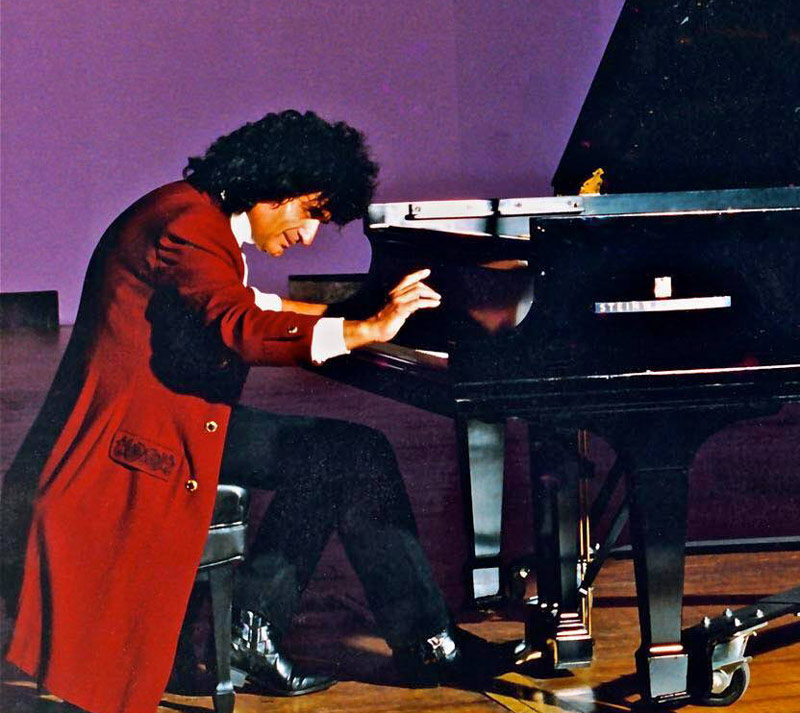
Patrick Moraz
Even more importantly, Relayer was startlingly surreal. Dissonant. Experimental. This was when Yes was at its best, its most innovative. For a time they became a little more than a bloated rock god coliseum-faring band. They broke all the rules here, and unfortunately didn't try that ever again to this degree. This one and Tales from Topographic Oceans were magnificently jarring, and the fact more folks dig Close to the Edge over these two brilliant sonic weirdos kind'a says it all. It's pop(ish) versus the real deal within the out-there Yes catalog. Sure, Edge is a more cohesive outing, and songwriting overall is a nice blend of accessibility and the daring. While Close to the Edge was (and still is) pretty cutting edge, they really picked up enormous artistic steam here. It suddenly seemed as if Yes was racing itself to become more bleeding edge, and in that respect Relayer and Topographic broke way ahead of the pack.
Indeed, a lot of Yes fans begrudge this one's self-indulgence, and it can arguably be said Relayer and Topographic helped end the era of Prog by being, well, so Proggy. Relayer understandably goes over people's heads. And it should. I honestly to this day don't know why Prog struck such a chord in the pop charts.

Chris Squire
Case in point: Sound Chaser is like three or four different songs strung together, and parts of it are downright alien. They feel like a whole genre being born, such as that frenetic section in the first half with Patrick Moraz's jazz / rock fusion electric piano, Squire's bass firing off a different theme in the tenor range (sounding at times like Jeff Berlin), and Steve Howe zipping around as well. It's a strange crossbreed between fusion and post-modern classical, where the song sways wildly in tempo at times. like the whole band is listing to one side and then the other. Compared to their hit tune earlier, Roundabout, this is pure avant-garde.
Then there's that startling chunk that pops out of nowhere just after the song breaks into pieces and gets restarted in tempo. A blur of overdubbed “huh's” - like heavy breathing – with that curious but tingly scatting of “cha cha cha...cha cha” appear. There's a futuristic, techno tribal feel to it, and it is apparently Anderson borrowing from Balinese cultures. The end effect, however, is a bit mind-bending. Your brain immediately asks “what the hell was that?”

Howe, Anderson in background
Many have different reactions and find it amusing, but it's meant to take you places you haven't before, so ditch your ethnocentric bias when listening.
Sound Chaser is also where Howe shines brightly. His use of pedal slide steel is taken to new heights here. It was always jaw-dropping, especially from Close to the Edge and Yessongs onward. Instead of the twangy and garish way that instrument is usually used in country, there's all kinds of echo applied and other effects, and he often makes it sound like a classical soprano – sometimes one from another planet. Just before the song's end he takes the instrument up into this unusual screechy part of its range, creating a harsh yet beautiful noise. It's one of Yes' more intense moments.
To Be Over is a lovely ballad that floats along effortlessly – until it starts to tear at convention again, even if it goes on a bit long. Then, near its end, it gets a triumphant, bold and joyous feel (a little like that ebullient final piece in Genesis' Supper's Ready). Here, Howe gives you the chills as his pedal steel soars way up there with angelic slides between notes.
The Gates of Delirium is an action-packed monster that again takes up a whole side, and it brilliantly showcases Moraz's different sides, but often a darker one that experiments with screams from his synths. Delirium has its spots where Yes drags once more, as this hefty, long-winded approach – no matter how innovative at times – can expand on its ideas for too long. Still, its jagged, dense arrangements and piercing melodies are meant as an impressionistic display of Anderson's lyrical look at war, and that works. It all drives home the point well. For a change, Anderson is clearer on the intent of his words: they're not the hazy, loopy word salad he often came up with at the time. (Which actually is fine - but that's another story.)
Meanwhile, throughout the entire work, Squire is perhaps at his very best. He's at once lightning fast, graceful, and dizzyingly complex. It's very possible Relayer contains some of the most interesting bass work ever, by anyone.
Relayer ends up a standalone oddball in Yes' catalog, but a distinctly brilliant one. It's a direction many, many fans wish was explored a little more.
For some reason, on my travels up and down the Oregon coast, one of these two albums would be blaring from my thumb drive as I would enter Tillamook. I have a lot of memories of simply sitting in my car – in the pouring rain, of course – in the Tillamook Freddy's and unable to move, just stunned by all the tiny little parts of Relayer's three tunes, each instrument interlocking and careening off each other.
These Retro Reviews from Oregon Coast Beach Connection are a new and occasional direction here, looking at music (mostly Prog or Prog-ish) and cinema / TV that needs a new generation to find it.
Tags: Oregon coast entertainment, Music Reviews, Prog, Yes, Patrick Moraz, Progressive Rock, 1970s
Cannon Beach Lodging
Nehalem Bay Lodgings
Manzanita Hotels, Lodging
Three Capes Lodging
Pacific City Hotels, Lodging
Lincoln City Lodging
Depoe Bay Lodging
Newport Lodging
Waldport Lodging
Yachats Lodging
Oregon Coast Vacation Rentals
Oregon Coast Lodging Specials
More About Oregon Coast hotels, lodging.....
More About Oregon Coast Restaurants, Dining.....
 Andre' GW Hagestedt is editor, owner and primary photographer / videographer of Oregon Coast Beach Connection, an online publication that sees over 1 million pageviews per month. He is also author of several books about the coast.
Andre' GW Hagestedt is editor, owner and primary photographer / videographer of Oregon Coast Beach Connection, an online publication that sees over 1 million pageviews per month. He is also author of several books about the coast.
LATEST Related Oregon Coast Articles
Various Oregon Coast Road Issues At Least Partially Solved, Including OR 6Hwy 6, 101 near Neskowin, others at least partially open. Tillamook, Coos Bay, Bandon. Traffic
Comet 31/Atlas Caught By Portland, Oregon Man On Its Way Out
Snapped by a Portlander as it zips out of the solar system. Astronomy, sciences
Wildlife Officials Offer Rewards for Info in Multiple Oregon Gray Wolf Poachings
The latest in southern Oregon, preceded by others in the east
Central Oregon Coast Jazz Gig Shows Off Hints of African, Caribbean
Adam Moezinia's Folk Element Trio plays Lincoln City Jan 21. Lincoln City events
First Day Hikes Take Place All Over Oregon and Coast to Start 2026
A special tradition in Yachats, but also Brookings events, Gold Beach events, Port Orford events, Coos Bay events, Bandon events, Florence events, Yachats events, Newport events, Lincoln City events, Rockaway Beach events, Manzanita events, Cannon Beach events, Seaside events, Astoria events
South Oregon Coast Gets Yummy: Charleston Crab Feed, Robert Burns Celebration
22nd Annual Burns event Feb 7; 41st Charleston Crab Feed Feb 14. Coos Bay events
2026 Beachcombers 'n Glass Float Expo Brings Real Glass Floats to Washington ...
Feb 14 through March 8 they're dropped; Expo at Ocean Shores March 7?8. Washington events
Oregon Coast's OR229 Shut Down Indefinitely by Severe, Chasm-like Landslide
Video: ODOT said it could be months - or longer. Rural road between Depoe Bay, Newport. Weather, traffic
Back to Oregon Coast
Contact Advertise on Oregon Coast Beach Connection
All Content, unless otherwise attributed, copyright © Oregon Coast Beach Connection. Unauthorized use or publication is not permitted





